MercoPress. South Atlantic News Agency
Tag: Brazilian Central Bank
-
Thursday, June 19th 2025 - 09:49 UTC
Brazil: Selic rate upped for the seventh straight time
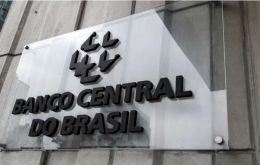
Despite falling inflation, Brazil's Central Bank (BCB) raised the Selic interest rate on Wednesday by 0.25 percentage points to 15%, its zenith since 2006, citing ongoing economic uncertainty. The unanimous Monetary Policy Committee's (Copom) move surprised local markets, who anticipated it would stay at 14.75%.
-
Thursday, February 6th 2020 - 08:17 UTC
Brazilian central bank cuts interest rate to 4.25%, but the easing cycle could be coming to an end
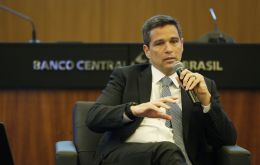
Brazil’s central bank intends to hold interest rates going forward to consider the impact of the record-breaking monetary easing cycle it concluded on Wednesday with a quarter-point cut.
-
Tuesday, August 13th 2019 - 06:30 UTC
US/China trade war and the Argentine situation impacts on Brazil's central bank policy of lower interest rates
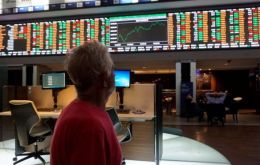
Brazil’s central bank will have to weigh potential price pressures from the U.S.-China trade war against prospects of a disappointing recovery when determining how long its easing cycle will last.
-
Tuesday, January 28th 2014 - 05:00 UTC
Brazil current account deficit ended 2013 at its widest in twelve years

Brazil's current account ended 2013 at its widest deficit in 12 years amid a weakened foreign trade balance, heavy outgoing service payments, overseas profit remittances and an overall lack of confidence in the country's economic policies.
-
Wednesday, September 4th 2013 - 01:26 UTC
Brazil's inflation tendency again picks up as food and transport prices rebound
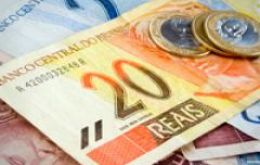
Brazil’s twelve-month inflation ended August at its lowest level this year, according to a central bank survey of fourteen economists. This means the 12-month IPCA consumer-price index is likely to weigh in at 6.10% for August, down from 6.27% at the end of July.
-
Thursday, July 11th 2013 - 17:02 UTC
Brazil ups basic rate to 8.5% to combat inflation; markets forecast 9.25%/10% by end of the year
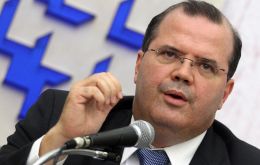
Brazil’s central bank raised the benchmark interest rate a third consecutive time and anticipated that the tightening cycle may be extended through the rest of the year as policy makers fight inflation.
-
Tuesday, December 11th 2012 - 16:27 UTC
The Economist and President Rousseff clash over ‘Brazil cost’ and Mantega
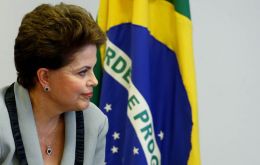
President Dilma Rousseff reiterated she wouldn’t be influenced by The Economist magazine’s call for her to oust Finance Minister Guido Mantega after a growth report that fell short of government forecasts.
-
Thursday, November 29th 2012 - 14:00 UTC
Brazil ends cuts and keeps key interest rate unchanged at 7.25%
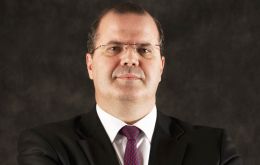
Brazil's central bank kept its key interest rate unchanged at 7.25% on Wednesday, ending a series of cuts since last year, as the world's sixth largest economy tries to contain inflation.
-
Wednesday, October 31st 2012 - 20:44 UTC
Brazil’s primary budget surplus rapidly narrowing but Central bank confident target is within reach
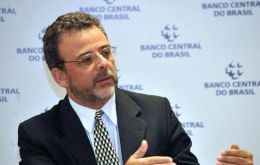
Brazil's primary budget surplus narrowed in September, distancing the government from its full-year surplus target, but the central bank said that target is still within reach. The accumulated primary surplus of January through September narrowed to 75.8 billion Brazilian Reais (37.3 billion dollars) from 104.6 billion Reais in the same period a year earlier.
-
Tuesday, October 16th 2012 - 00:07 UTC
Brazil insists in criticizing US monetary policy, but “we are prepared”
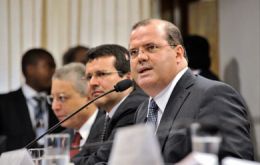
Brazil’s central bank president Alexandre Tombini refuted on Monday arguments that the US expansionist monetary policy do not harm emerging countries such as Brazil.
